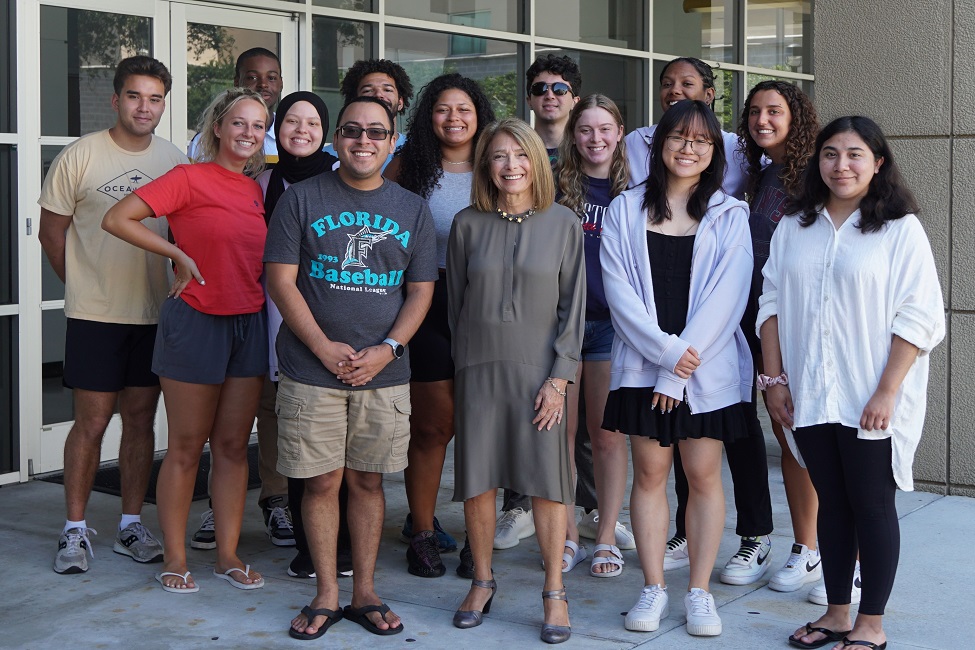FAU Awarded $1 Million NIH Grant for New Florida Summer Institute

Inaugural class of the Florida Summer Institute in Biostatistics and Data Science. Katherine Freeman, Dr.PH, principal investigator, pictured in front and center.
Florida Atlantic University’s Schmidt College of Medicine received a $1 million grant from the National Institutes of Health (NIH) to launch the first Florida Summer Institute in Biostatistics and Data Science in the Southeastern United States – and one of only 10 sites across the nation. FAU is working in collaboration with the University of Miami and Florida International University on the program, which is focused on health disparities related to cardiovascular and infectious diseases. The summer program runs annually from mid-May through June, with a new cohort for each of the five-years of funding.
The NIH Summer Institute in Biostatistics and Data Science, which is sponsored by the National Heart, Lung, and Blood Institute and the NIH Office of Data Science Strategy, offers an extensive six-week summer training experience centered on biostatistics, epidemiology and data science. The program includes relevant examples from data collected in real research studies of prevention and treatment of infectious, immune-mediated and chronic diseases. The program introduces college students and recent graduates to the principles, methodologies, uses, and applications of statistical methods in biomedical and clinical research.
Both FAU and FIU have received federal designation as a Hispanic-Serving Institution by the U.S. Department of Education, and UM is a leading private institution with significant diversity. The innovative Florida Summer Institute in Biostatistics and Data Science introduces rigorous quantitative careers to young adults from varied backgrounds through the combined efforts of these three ethnically diverse institutions.
“We successfully recruited students nationally from groups typically underrepresented in the biomedical sciences for our inaugural program, which ended in June,” said Katherine Freeman, Dr.PH, principal investigator, professor of biomedical science in FAU’s Schmidt College of Medicine, and biostatistics collaborative core leader at FAU. “Although the curriculum encompasses basic, advanced and cutting-edge statistical and data science methods delivered in ways to engage students, it also highlights scientific communication, collaborative skills, project teamwork, social interactions and career guidance.”
Participants in the summer program learn the principles of applied biostatistics and data science from recognized experts in the field, meet and learn from practicing biostatisticians and investigators engaged in clinical research, and gain hands-on experience working with data collected in internationally recognized studies. In addition, students benefit from a stimulating environment of education and mentoring to introduce and explore an ever-growing field that makes a positive impact on health and quality of life.
The Florida Summer Institute in Biostatistics and Data Science’s diverse leadership team and faculty have unique complementary skillsets in biostatistics, epidemiology, health economics, computational biology, AI, machine learning (ML), and big data analytics. The intensive six-week training experience is driven by research questions that highlight health disparities and social drivers of health, using current cardiovascular, COVID-19, congenital toxoplasmosis and medical marihuana databases.
“This National Institutes of Health grant, which launched the Southeastern U.S.’s first Florida Summer Institute in Biostatistics and Data Science, will help to address the critical shortage of biostatisticians and the inclusion of a pipeline of qualified young adults to grow our workforce of the future,” said Julie Pilitsis, M.D., Ph.D., dean and vice president for medical affairs, FAU Schmidt College of Medicine. “Our senior biostatistics faculty are committed to teaching, collaboration and conducting clinical and translational research. Students enrolled in the program will benefit from their expertise and gain important insight to help them achieve their career goals.”
The Florida Summer Institute in Biostatistics and Data Science will continue to recruit nationally over the next four years to enroll about 75 qualified undergraduate and early graduate students with requisite mathematics, statistics and science coursework and a budding interest in health. In addition, alumni will retain mentorships with faculty and have access to revised curriculums for five years after completion of the program.
-FAU-
Latest News Desk
- FAU's Queen Conch Lab Receives Prestigious International AwardFAU Harbor Branch researchers have received the 2025 Responsible Seafood Innovation Award in Aquaculture from the Global Seafood Alliance for its Queen Conch Lab's pioneering work in sustainable aquaculture.
- After Cancer: Study Explores Caring-Healing Modalities for SurvivorsResearch from FAU's Christine E. Lynn College of Nursing highlights how caring-healing methods like mindfulness can ease distress and build resilience in cancer survivors.
- FAU Researchers 'Zoom' in for an Ultra-Magnified Peek at Shark SkinWhat gives shark skin its toughness and sleek glide? Tiny, tooth-like denticles. Researchers used electron microscopy to reveal how these structures shift with age, sex, and function in bonnethead sharks.
- FAU Receives $1.6M Gift for Student Entrepreneur ScholarshipsFlorida Atlantic University received a $1.6 million gift from long-time Boca Raton resident Bob Schattner, which will be used to continue providing scholarships that he established 15 years ago in perpetuity.
- FAU Lands $3M Federal Grant to Prevent Substance Use in At-risk Youth"Rising Strong" will support more than 3,000 South Florida youth with trauma-informed, evidence-based prevention, empowering vulnerable populations to build resilience and choose substance-free futures.
- FAU Research: Logistics Expansion Slows as Transportation Prices DropThe Logistics Managers' Index had the lowest overall reading since March as the supply chain reacts to economic uncertainty, according to researchers from Florida Atlantic University and four other schools.






